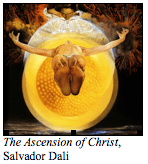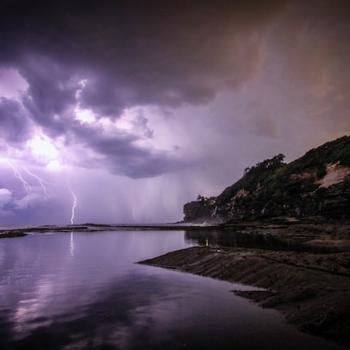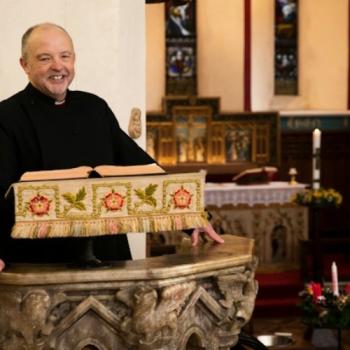
By Matthew Potts - May 19, 2009
As if resurrection from the dead weren't miracle enough for believing Christians to swallow, the resurrected body of Christ leaves another problem for forensically minded modern Christians in this season after Easter: what happened to Jesus' body after the resurrection? The Feast of the Ascension aims to answer this question. In the twenty-fourth chapter of Luke and the first chapter of Acts, the same author tells us that Christ bodily ascends into the heavens in full view of his disciples.
In many ways I still can't wrap my mind around this weird feast. It is weird, right? Jesus does what? He floats up into the sky? In Jesus' time, people thought the world was flat and heaven was a sort of geographical location above us. So I can understand how, at the time, to the disciples, going up seemed a logical thing for a resurrected Jesus to do. But we're in a different time now. The world isn't flat. We're spinning around and around; "up" is all around us in orbit. Above us is just space. Whatever they think about heaven, most people don't think heaven is simply the same thing as the cloud layer. If Jesus' body floated up into the sky, where did it go? Is it floating out in space somewhere beyond the solar system? I can't believe that. But if not that, where is it? Was his body absorbed somehow into the atmosphere? Or did his body just vanish when he arrived at some height in the heavens? Most troublingly, if Jesus' physical, material body eventually disappeared, if that risen flesh into which Thomas placed his doubting hands eventually had to fade away like any other flesh, isn't that the same things as death? Did Jesus rise from death just to fade away again? If so, what was the point of his rising in the first place? But if it didn't fade away, where is it now? Like I said, I just don't get it. However I slice it, the Ascension remains a mystery to me.
And I've decided that's okay. There's a line from the book of Acts which is traditionally read on this day: "Yours is not to know the times or periods that the Father has set by his own authority." And that's true. Mystery can be acceptable, if at times frustrating. In one of my favorite books there's a character who says, "in this world more things exist without your knowledge than with it," and I guess he's right. Most of the universe - from how many stars there are in our galaxy to how many neurons there are in my brain; from how my cell phone works to how my liver works; from what lies at the depths of an ocean to what lies within another's heart - most things are a complete and utter mystery to me. So the Ascension is just one more thing among several, I suppose. One thing I can say, though, is that these ineffable mysteries about Jesus - for me anyway - are a lot easier to accept when I think about what they mean to us today, rather than what they meant to Jesus. This mystery, like so many others in our faith, can perhaps be important for what it says should happen to us, even if we can't quite wrap our minds around what it says must have happened to him.
So let's set aside for a moment the miracle of Jesus' ascension. At his departure into the sky, what does Jesus say should happen to us? In the traditional ascension accounts, from Luke 24 and Acts 1, a common theme is preserved. In Luke, Jesus says that we must proclaim forgiveness in Jesus' name to all the nations of the world. In Acts, Jesus is a bit more specific, saying we will be his witnesses in Judea and Samaria, and to all the ends of the earth. Two thousand years later, I think we tend to sort of gloss over these statements of Jesus, we're blinded by the brilliance of this ascension miracle, but in fact they are incredibly revolutionary words, especially then but also today. We take for granted that God should be interested in all the nations and peoples of the world, but in first century Judea there was no such assumption. Nonetheless Jesus says, "Go out into all the world, repenting and forgiving and witnessing to me." And not just into the world, but specifically to Samaria, Judea's chief rival and enemy. Go first to your enemies, Jesus is saying, go first to the ones who have wounded you most, of whom you are most afraid, go first to the place you most wish not to go, go first to those who most wish you harm, and witness first among them to God's forgiveness and love through your own forgiveness and love.
Mark Twain once said, "history doesn't repeat itself, but it rhymes." I can't wrap my mind around the history of the Ascension and I probably never will. I don't know what actually happened at Bethany that day so many springs ago. I don't know where Jesus' body went then, and I don't know where it is now. I don't, I can't understand that history. But if I can't repeat it, maybe at least I can rhyme it. Perhaps God doesn't need us to understand and recreate that impossible mystery in our world today. Perhaps God just wants us to try and make our lives rhyme with it, through love and repentance and forgiveness. We don't need to levitate like Jesus on the outskirts of town, we just need to love like Jesus in the streets. The miracles are God's job and they will remain to us sheer mysteries; but we humans meanwhile have been left with the happy, difficult business of rhyming our real lives with those miracles. The Ascension isn't for repeating, it's for rhyming. Who knows how ascension happened to Jesus? Thank God for how ascension can happen to us. We Christians are called to be songsmiths, versemakers, poets of a holy lyric passed on to us by generations and the grace of God through two thousand living years, singing the death, resurrection, and ascension of our messiah Jesus. May we, so many stanzas later in the singing of this saving song, rhyme and ring out the love of Christ with our lives.
1/1/2000 5:00:00 AM




